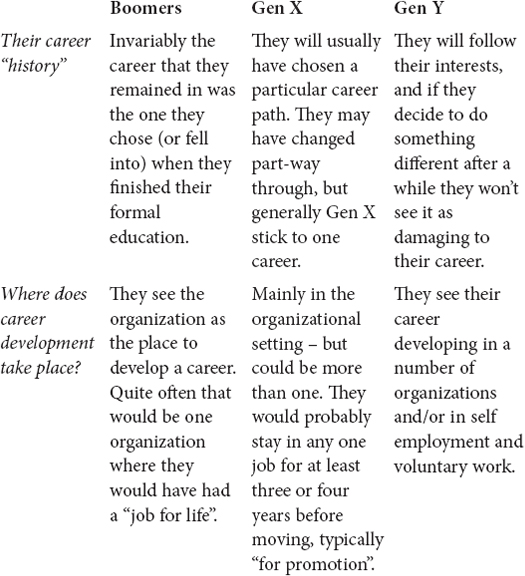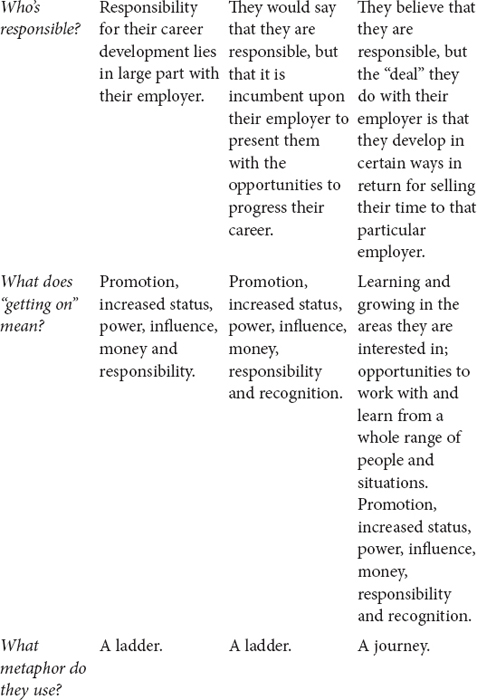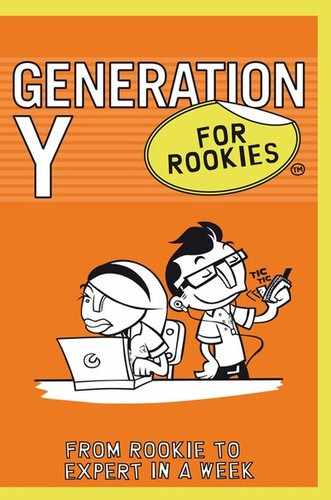CHAPTER 7
Career development and
Gen Y
What does “career development”
mean to the different generations?
If you are in any way involved with helping Gen Y in their careers, then this chapter is a must-read for you. It will help you understand:
• What “career development” means to Gen Y (and how this differs from what it means to the other generations).
• How you can best support Gen Y in their career development.
It is important to look at what we mean by career. In the twentieth century, the term “career” usually referred to the work a person did to earn their money. It was particularly used in relation to people in the “professions” – for example, doctors, lawyers and architects.
Boomers and to some degree Gen X would generally make a career choice and start on a particular career path early on in their life, and stick to that path.
The notion that organizations are the places to develop your career was certainly true for the older generations, but is much less so for Gen Y.


Of course it would be wrong to generalize about what each generation defines as “getting on”. Each generation values many of the same things in their career that the other generations do: what is different is the relative importance of these things. Also, Gen Y value, want and expect the opportunity to learn and be fulfilled in their careers, whereas the other generations were conditioned to expect a “living” from work, but without expecting personal fulfilment. Boomers and X-ers are more concerned with what you might call the “hygiene” factors, or those things that are important for survival – money, securing your position (through power and influence) and gaining recognition from others, which is where status, job title and the like come in. Gen Y on the other hand still want the hygiene factors to be in place (although they seem to care less about status, except when it can bring them positive influence), but they are more interested in self development and are more self-referenced (in other words, it is more important that they themselves think they are getting on than that a senior boss tells them they are). That is not to say they don’t want recognition – they like it. But they don’t rely it as the only measure of how they are doing.
 Rookie Buster
Rookie Buster
Gen Y value, want and expect the opportunity to learn and be fulfilled in their careers.
The way organizations approach career development is clearly more influenced by the Boomer and Gen X view of careers than it is by the Gen Y view. That is not surprising, of course, as the notion of what a career means has not changed much over many years, and the people who are responsible for employees’ career development in most organizations are from the older generations themselves.
What you need to know about Gen Y
and how they see their careers
The most important thing to remember is that each person is an individual, and so you need to understand what is important to that individual. Organizations do of course have to handle career development for many people – sometimes thousands of people – so it can be a challenge to take account of each individual’s aspirations. It is possible to do this in a very manageable way, however. We will come back to this later.
 Rookie Buster
Rookie Buster
The most important thing to remember is that each person is an individual, and so you need to understand what is important to that individual.
Having said that, there are common themes that emerge from the research and my work with hundreds of Gen Ys.
We heard Lamorna’s story in Chapter 3. Let’s take a look at what career development means to her and what she says she wants and expects from her career:
• “A chance to do interesting work and prove myself.”
• “Work that means something to me and hopefully does some good for others.”
• “Something that plays to my strengths and passions.”
• “A challenge.”
• “A chance to learn from my peers and from my mentors (of all ages).”
• “A work environment without barriers where I have a chance to be creative and rise to the challenge.”
Lamorna earns a very modest salary and says that she would like to earn more to be able to pursue hobbies and interests, but that she would never take a job for the money if it didn’t meet the criteria above.
Having had the experience of applying for and being rejected for many graduate schemes, she has come to the conclusion that there is no way she would fit into a typical organization – she says there are too many barriers.
The example of Lamorna is of course just one person’s story, but there are lessons in it for those who are responsible for career development in organizations everywhere.
What career development
opportunities do you need to offer
Gen Y?
Here is what Gen Y want (but remember, this will vary from person to person – we will look at how to handle these varying needs later on in this chapter):

• Meaningful work – that is, work that is meaningful to them. Of course what is meaningful to one person may not be meaningful to another. The key is to find out what their work means to them – it may be about contributing to the community, it may be a chance to learn from others, to contribute to projects that they find exciting, to fight for justice… The list is endless, which is why it is important to understand what represents meaning to them. It is so easy to make incorrect assumptions when we hear the phrase “meaningful work”.
• A chance to do interesting work, or work that they love. Again this varies from individual to individual. What is interesting work to one person may be deadly boring to another. There will be some people who love working on numbers and spreadsheets and solving numerical problems, while others would hate that. One of the traps we fall into as human beings is to assume that others are similar to us, and that what we find boring others also find boring. That is of course untrue. So, again the key is to find out what they love and what they find interesting. Regardless of the range of jobs you have to fill in your organization, each one of them will be interesting to someone out there.
• The opportunity to learn. As we have already seen in the previous chapter, this is a biggie for Gen Y. They see their careers much more in terms of the knowledge, skills and capabilities that they are able to pick up along the way, rather than as a set of steps up a promotional ladder (which is of course implicitly linked to a person’s knowledge, skills and capability acquisition – but Gen Y care less about the ladder and more about the learning). Again, different people will be interested in learning different things. But learning is key. And ideally they will be given help in the form of training, development, coaching and mentoring. They like a challenge, and learning provides that challenge.
• The opportunity to work with great people. Time and time again, Gen Ys talk about the importance of colleagues. They want to work with people who are inspired and inspiring, and who are interesting and interested. This is partly linked to their desire to learn, and partly to their need to be part of a team of purposeful people.
• Recognition. Like the rest of us, Gen Y like recognition. They appreciate feedback and use the feedback to gauge how well they are progressing in their work and their career.
• Promotion. This is important to Gen Y for the recognition it implies and the increased influence that it brings. Some are interested in status, but even if status is important, it is of secondary importance. The problem is that many organizations get very wrapped up in the idea that to offer decent and appealing career progression they have to be able to offer promotion (it’s the ladder metaphor again). Promotion certainly plays a part (although not for all people), but there are many other aspects that are equally if not more important. And in this world of flattening organizational structures, the other elements are easier things to offer than promotion – which is limited, as there are only a certain number of positions on offer and they get fewer as you go up the ladder.
• “Show me the treat.” This is the phrase one Gen Y used when he was asked what career development meant to him. He said he always wanted to know what “reward” was on offer for the efforts he made. In his particular case, the rewards he was interested in were primarily training and learning. He equated career progression with the acquisition of skills and knowledge and was keen to take up any learning opportunity that was given to him. He gave examples of learning opportunities he had had that he considered to be excellent career development. He had instigated most of them himself, and his company had supported him. Some of them were directly related to his job as a sales manager; others were not. They included: attending a day’s seminar on Generation Y and technology (he got to attend for free in return for being on a Gen Y panel); a chance to devise a sales commission scheme with some guidance from a colleague; designing and developing a training manual for a call centre (this was a self-appointed task); and a management training course. All of these activities were his “treats”. They kept him motivated and engaged because he felt he was developing his career, as well as learning how to do his job better.
 Rookie Buster
Rookie Buster
There is a whole range of offerings you could give to Gen Y that would represent career development for them.
There is a whole range of offerings you could give to Gen Y that would represent career development for them. You may not have thought of some of them as career development, but they may be very cheap and easy to offer. You are happy; the Gen Y is happy!
The practicalities – how to
implement a career progression
scheme that works for Gen Y
OK, so now you understand how Gen Y differ from their Gen X and Boomer colleagues. And you realize that it is impossible to generalize, as all of us see career development and progression in different ways. Given all of that, what can you do to provide a career development/progression scheme that works for Gen Y?
Here are the three steps to an effective career development scheme.
1. Speak to them as early as possible
Ideally speak to them during the selection process about what career development means to them. Here are some useful questions:
• “What is important to you in a career?” (Many people will not have thought about this – by asking them this question you will help them, as well as the organization, to understand how to engage and retain this person.)
• “What do you mean by ‘xxx’?” (This is a follow-up question that ensures you understand what exactly their definition is of what they have just told you – it is important you don’t use your own definition, which more likely than not will be different from theirs.)
• “What will need to happen for you to feel that you are developing your career as you want to?”
• “From everything you have said, what are the most important top three in terms of feeling your career is developing?”
The answers to these questions will help you to understand what you need to do for this person in order for them to feel they are getting good career development. If there are things they want that you can’t offer, it is best to know about this and have a conversation about it as early as possible. Perhaps you can talk through how else they may be able to achieve the development that can’t be offered by your organization – maybe through voluntary work, job swaps, and so on.
The other benefit of gaining this insight is that there may be career development opportunities you currently offer that no one is interested in. By understanding their interests, and targeting your support to those interests, you could save time and money on courses and other activities that are not appealing.
2. Review what you have in place under the
banner of “career development”
Typically, organizations have a suite of training courses, mentoring schemes, a promotion ladder, job rotations and placements. Assess each of your current “offers” against what the Gen Ys have told you they want. It may be that some of them are not appealing, or it may be that some are misunderstood and simply need to be re-described in a way that “sells” the benefits in Gen Y’s language. For example, a job placement scheme in a customer organization could be a very appealing prospect if you explain how much the participants will learn and extend their network of contacts.

3. Help the Gen Y to articulate a simple
“career development” plan
The “career development” plan should contain the answers to all the questions in Step 1 and also contain some detail of how they will achieve those needs. This plan is something they can review frequently with their manager, mentor and/or the graduate development manager. It is a great way of encouraging them to regularly reflect on how they are progressing. This is really important: often people are actually learning and developing on a day-to-day basis in all sorts of situations, but they don’t think about the fact that this is developmental activity. Simply having good quality conversations about their development is very beneficial, and should be an intrinsic part of any career development strategy.
A core part of any career progression strategy is to:
(a) help the person to articulate what career development means to them;
(b) help them to identify what they can do to develop in the ways they want;
(c) pinpoint specifically how the organization can support them;
and, last but not least,
(d) have regular conversations about what they are learning and how that learning supports their career development.
Coach’s notes 
1. Understand (and challenge where necessary) the organization’s assumptions about what career development/progression means.
2. Build into your recruitment and induction process a conversation with each new hire that elicits their career development aspirations.
3. Appoint one person to be responsible for having ongoing, regular conversations with your Gen Ys about their development and how what they are doing contributes to their stated career progression goals.
4. Make sure that the person with whom they have the ongoing development conversations is skilled at handling good conversations.
5. If you involve them in some career development activity that the organization has identified as important, help them to understand why. Explain the benefits to them as well as to the organization.
6. If any of your people have career development aspirations that cannot be achieved in your organization, then be honest about that and explain why. Gen Y don’t expect you to deliver everything they want, but they expect openness and transparency.
Go for it! Remember Lamorna? She had a clear idea of what career development meant to her. She didn’t expect anyone to deliver it on a plate; she just expected them to be interested in what she wanted to achieve and to support her as much as possible. Many organizations get bogged down in elaborate career development processes and programmes and lose sight of the basics. They also get very worried about being able to “manage people’s expectations”, when in reality they do not have a good understanding of those expectations to start with. It should be clear from this chapter that good quality, regular conversations are at the core of a great career development scheme.
Get the basics right and you will not go far wrong. You will have a workforce of people who feel listened to, understood and supported. And where you cannot support them in their career aspirations, they will understand why. This of course applies not just to Gen Y, but to all generations, and it will lead to an engaged group of productive people who appreciate and feel loyal to their organization.


